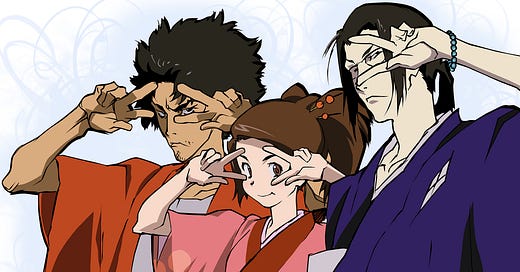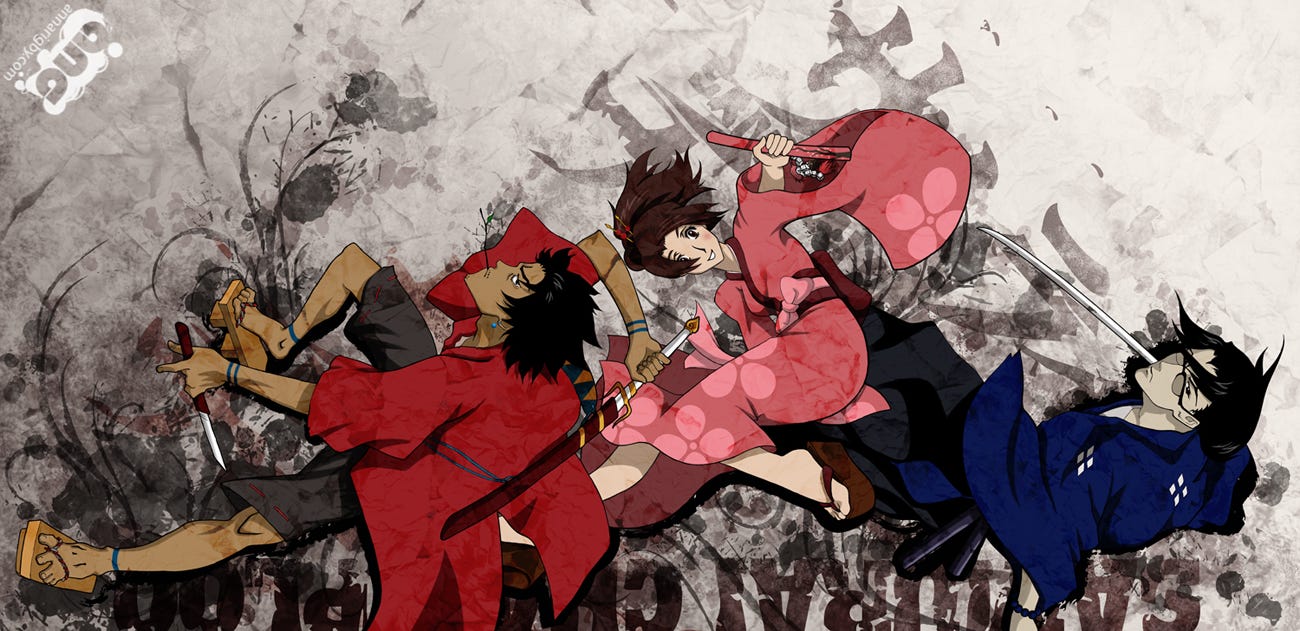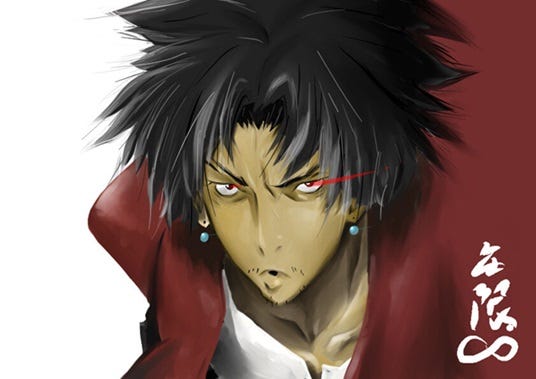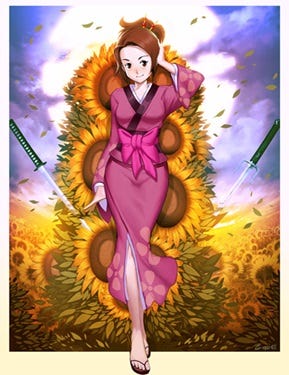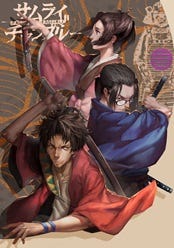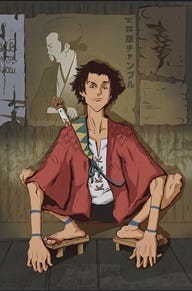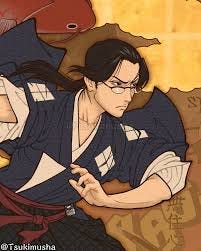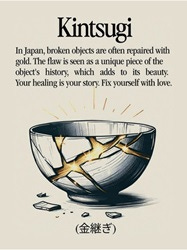Samurai Champloo’s Lessons for Chronic Illness and Self-Discovery
For those of us facing chronic illness or personal hardship, their journey can offer surprising lessons in finding purpose and resilience.
Yo! What’s up, Patrick here. I’m channeling my hip-hop soul, burning the fires of passion…and doing other stuff…! Thus, I deliver unto you another Kintsugi to Ikigai newsletter—this time, we’re hitting the road with Samurai Champloo.
In last week’s look at Cowboy Bebop, we pondered emptiness and this week continues with the same themes. A group of people are living in a pleasant limbo as they journey. But their pasts are filled with things they would forget if they could, and their futures are unclear. However, they know they must move on but finding the resolve for that is even more difficult than locating the elusive “samurai who smells of sunflowers” that Fuu drags Mugen and Jin across the country to find.
We explore how three wandering souls navigate a chaotic world with nothing but their swords, instincts, and a shared quest. For those of us facing chronic illness or personal hardship, their journey can offer surprising lessons in finding purpose and resilience.
Samurai Champloo & the Road to Ikigai
Samurai Champloo is set in an alternate Edo-era Japan, mixing samurai drama with hip-hop beats and breakneck fight scenes. At its core, though, it’s a story about forging one’s own path when life feels directionless. Fuu, a plucky waitress, enlists the volatile Mugen and the reserved Jin to help her find the “samurai who smells of sunflowers.”
In Japanese thought, ikigai (生き甲斐) is your reason for getting up in the morning. Mugen, Jin, and Fuu often struggle with their own motivations—freedom, honor, or closure—but it’s precisely in their search that they uncover slices of meaning, however fleeting. For those with chronic illnesses, life can feel unpredictable, yet each small step—like each episode of Samurai Champloo—can reveal new layers of resilience, even amid chaos.
3. Characters & Philosophical Influences
Mugen
Psychology: Brash, instinctive, allergic to authority. Chaotic energy incarnate.
Philosophy: Hints of Nietzsche’s “will to power”—he refuses to be constrained, forging his own rules.
Relevance: Sometimes raw defiance is a necessary spark when facing life’s limitations. It can remind us to push back against complacency.
Jin
Psychology: Stoic samurai haunted by guilt. Deeply bound to traditional bushidō codes, yet ironically cast adrift.
Philosophy: Zen undercurrents—he seeks clarity through discipline and quiet observation.
Relevance: Shows how stillness and reflection—like mindful meditation—can be a steady anchor, especially when health issues feel overwhelming.
Fuu
Psychology: Hopeful, determined, often impulsive. The glue that binds Mugen and Jin.
Philosophy: Carries a sense of mono no aware—yearning for a connection to her past, knowing time slips by.
Relevance: Her persistent drive, even with little clue of the outcome, mirrors the way we cling to life’s small joys despite uncertainty.
All three display the essence of kintsugi (金継ぎ): each has cracks from personal trauma or regret, yet they keep traveling, forging golden lines of camaraderie and growth. Even if it’s messy and imperfect, they turn their broken edges into something that gleams with raw humanity.
Nujabes Tribute AMV
5. Five Quick Tips for Self-Discovery Amid Chaos
Daily Reflection: The Road Forward
Before bed, jot down one small “win” or forward step you took, no matter how minor. Remind yourself that continuous movement—even baby steps—carves your path.
Embrace Mini-Defiance
Channel your inner Mugen: do one thing differently this week (e.g., challenge a negative thought or routine). A little rebellion can spark motivation.
Silent Space (Jin’s Approach)
Set aside 5 minutes of quiet reflection or meditation daily. Observe your breathing, your feelings, and any tensions. Sometimes calm observation unearths hidden clarity.
Follow a Curiosity (Fuu’s Quest)
Pick a curiosity that’s been nagging you—maybe a new hobby or a question you want answered—and dedicate half an hour to it. Curiosity can open doors to purpose.
Kintsugi Mindset
Identify one “crack” in your life—an emotional wound, a setback—and envision it inlaid with metaphorical gold. Ask: how can I celebrate this flaw as part of my story?
Parting Thoughts
Samurai Champloo may feel like a frenetic mix of swordfights and hip-hop beats, but look closer and you’ll see a deeper search for identity, belonging, and meaning. Mugen, Jin, and Fuu’s journey reminds us that even if we don’t have it all figured out, movement matters.
For those grappling with chronic illness, this ethos resonates: we might not control every twist, but we can choose how we respond to each day’s unknowns. By blending defiance, quiet discipline, and heartfelt curiosity, we inch closer to our ikigai—the purpose that keeps us going, cracks and all.
Until next time, stay open to life’s unpredictability… you never know what bright seam of gold you’ll discover. See you on the journey!


